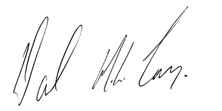Introduction
Hello everyone,
I hope this message finds you all safe and healthy.
To everyone, but especially our students, I want to extend these requests:
If you are unwell, stay home.
If you need help, please ask for it.
If you can safely act to help another, please do so.
Protect yourselves and, in doing so, protect all of us.

Dave Cooper
Assistant Dean Graduate Studies College of Medicine
Updates
April 3, 2020
Hello Everyone,
We know it has been an intense and stressful couple of weeks for everyone. We also know our graduate students have many questions. This update is an attempt to address some of the most pressing ones. I would like to extend my profound thanks to the Registrar, CGPS, OVDR, Vice Dean Radomski, Dean Smith and others who have contributed to this document over the past week.

Dave Cooper
Assistant Dean Graduate Studies College of Medicine
March 20, 2020
Good Afternoon Everyone,
Please see the message below from the Assistant Dean Graduate studies in the College of Medicine. This message has also been approved by the Office of the Vice President Research and the College of Graduate and Postdoctoral Studies. If you believe there is someone else who would benefit from this message please pass it along.
Subject: Working Remotely Policy Applies to Graduate Students and Postdoctoral Fellows
With Saskatchewan under a state of emergency the University of Saskatchewan has implemented a working remotely policy. This policy extends to graduate students and postdoctoral fellows. It is our expectation that supervisors and students/fellows will work collaboratively to safely wind down and/or minimize research requiring a physical presence on campus and take all possible steps to facilitate remote work immediately. No student or fellow should face retribution for acting to protect their health and caring for their loved ones during this time of crisis.
Please pay close attention to further updates from the Office of the Vice President Research and the College of Graduate and Postdoctoral Studies.
Dr. David Cooper
Assistant Dean of Graduate Studies
College of Medicine
Resources
Research
An update from the Office of the Vice-President Research:
Colleagues:
- Limit personal contacts, lab visits or trips into clinics and hospitals to the greatest extent possible; and
- Where appropriate, consider modifying or delaying your research studies to reduce in-person participant interactions. For some research, it may be possible to replace in-person interactions with telephone or online communication, depending on the nature of your protocol, the participants, and any additional risk that may arise by switching to different communication channels.
- Are you experiencing any flu-like symptoms, including a fever?
- Have you travelled outside of Canada in the past 14 days or been in contact with someone who has a probable or confirmed case of COVID-19?
- Have you been asked to self-isolate?
- Prioritizing projects – evaluate all work with criteria such as the need for personal protective equipment (PPE) (i.e., high-risk projects and projects which cannot be delayed until appropriate PPE is available).
- Sharing of PPE interdepartmentally and between labs to ensure that the PPE needs of all researchers are met.
- Implementing the use of appropriate reusable PPE (i.e., consider the use of re-usable style protective gloves rather than disposable)
-
- All individuals requiring respirators for their work must be fit-tested for the specific type of respirator that they will be using. To arrange for a fit-test, please email fittest@usask.ca.
- Utilize other safety controls appropriate for the work, such as certified biosafety cabinets and fume hoods.
Warm regards,
Karen Chad, Ph.D.
Vice-President Research
University of Saskatchewan
